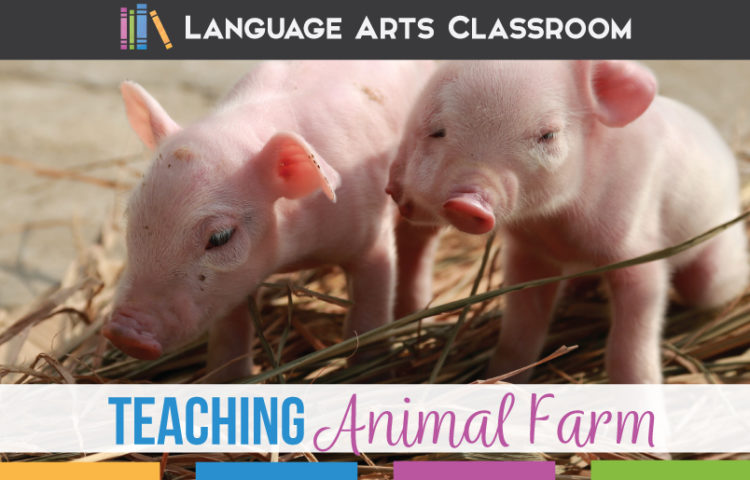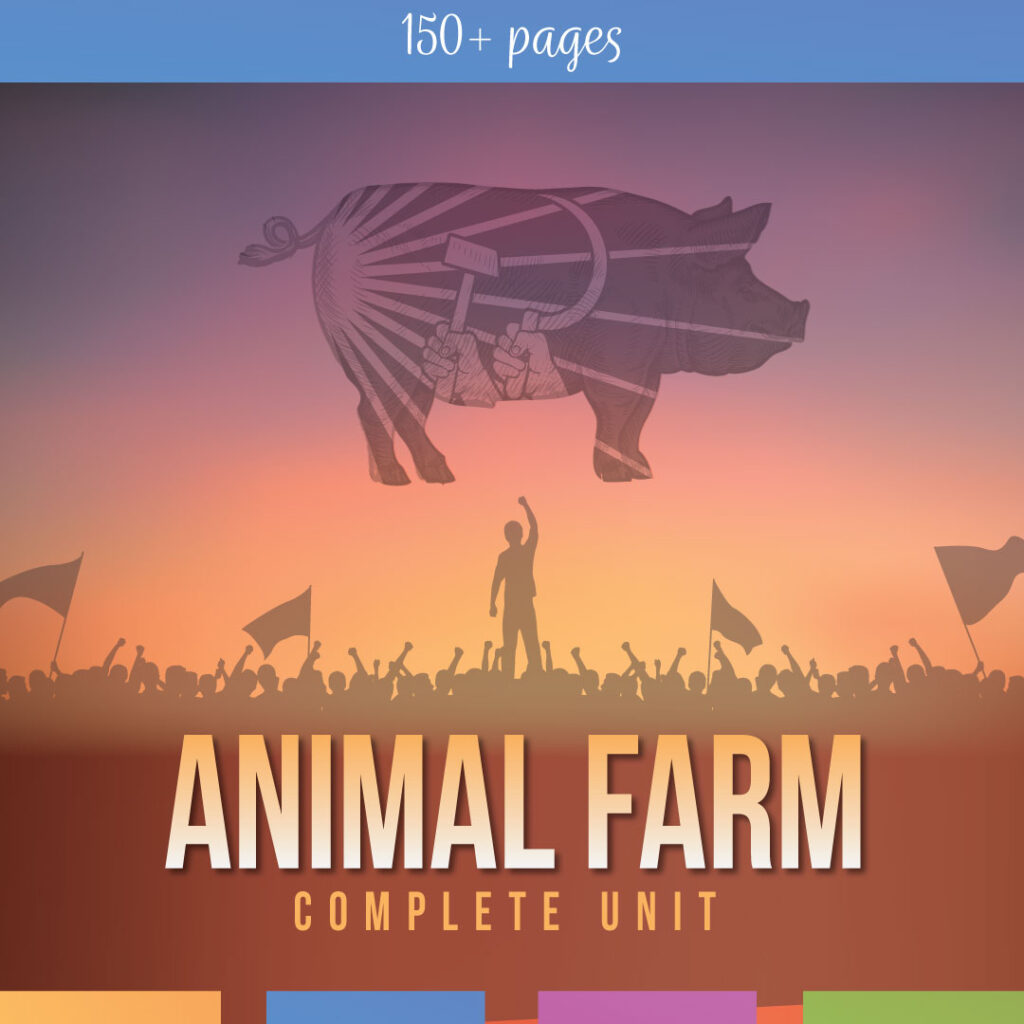Enhance your Animal Farm unit with interactive activities.
Engaging Activities to Elevate Your Animal Farm Unit
Animal Farm is a book that I could teach half asleep. (Not that I would. I enjoy the content, and love it too much.) I feel that I’m passionate while teaching it and developing Animal Farm lesson plans. I’ve taught it probably close to two dozen times. Easily, it’s in my top five favorite books to teach and create accompanying activities.
I created my Animal Farm unit after borrowing ideas from myself and mismatching ideas and never having complete cohesiveness. After finishing the vocabulary, research into World War II, and writing prompts, I realized that after I spent time covering events of the novel and historical time period, we then complete literary analysis.
Therefore, I’ve divided my Animal Farm free ideas below into those two segments—comprehension and analysis.
What grade would you teach Animal Farm?
Animal Farm is typically taught in high school, specifically for students in grades 9-12. Some middle schools read the story.
The complexity of the themes and allegorical nature of the novel make it more suitable for older students who can grasp the political and social commentary.
Can I teach Animal Farm without boring students?
Teaching Animal Farm requires a connection to students’ lives and to their experiences. Only when readers understand the vocabulary and concepts in connection to their lives will they understand the novella. Comprehension is important to understand the events of Animal Farm.
Fun Animal Farm activities should be an integral part of the lessons because the message remains important.
Relate brainwashing to their lives.
Part of successful brainwashing is the repetition of ideas—the changing of ideas. Students encounter subtle brainwashing in their lives. During my first teaching job, I worked next to an incredibly bright lady. The easiest way to teach this (she taught me) was to show advertisements. Open up any magazine, preferably a fat one with gobs of ads. Start flipping through. What do you see? Repeats—brainwashing of products. Lipsticks, mascaras, baseballs, video games: no matter what topic, you can show students that repetition is a major part of advertising.
And why? Because marketing executives know repetition works! The pigs were marketing themselves and their beliefs to the other animals. Show students this quick read that states, “Repetition is fundamental to the success of any advertising program.” The pigs knew that too.
Add a digital element to your Animal Farm lesson plans: Ask students to find an example of an advertisement that uses repetition. Students can look for print or videos.
Understand the hen-confession-scene.
The most difficult section of the book for students is when hens confess to crimes they didn’t commit. Understanding these scenes requires a psychological explanation. Why would people confess to something they didn’t do?! On the simplest of scales, bullied victims will align themselves with their bullies to end the teasing. Victims will go along with odd requests to be liked, to be left alone. Here, the hens were under stress to please Napoleon. This video from History can help students understand the situation.
Add a digital element to your Animal Farm lesson plans: What other psychological tricks does Napoleon use? Did Stalin use similar ones? Ask students to find research about manipulation, starvation, and devotion.
Don’t forget the propaganda.
Teaching the propaganda techniques in Animal Farm can be rewarding. The pigs’ techniques are over the top and unhidden to readers, so students easily recognize them.
Take for instance the use of songs and slogans. “Beasts of England” and parades serve purposeful features for the pigs, as does the seven commandments. Students eagerly recognize these propaganda techniques.
Our job, of course, is to question students about how they respond to propaganda.
Add the Seven Commandments to a wall.
This takes planning, but I wrote out the Seven Commandments one year, and my students talked about it for the next two years. I used a poster board and wrote the commandments. As I assigned chapters, I replaced one poster board with another, modifying the commandments as the pigs did. We would discuss the additions/subtractions during review. I never told students about switching the poster boards; I waited for them to notice.
And- what! Students don’t notice the changes immediately? Even better. Now they can see how easy it is to overlook something staring you in the face.
Add a digital element to your Animal Farm lesson plans: Create a simple background to your Google Classroom (or other platform) with the commandment. Change them every few days.
Map how the pigs are never the other animals’ equals.
Before the pigs took over the farm, they had taught themselves to read—automatically making themselves advanced. The increments of learning and regard from the pigs make equality long gone before the other animals catch on. Have students find the examples of how the pigs “better” themselves. Plus, this opens the door to a writing assignment concerning ‘equality’ and their society today (lots of textual evidence). It’s beautiful when the unit and lessons align, right?
Add a digital element to your Animal Farm lesson plans: What power does literacy provide people? Ask students to contribute a resource for their classmates. Create a hyperdoc with information for students to browse.
Can I teach literary analysis with Orwell’s story?
Yes! Young readers will have plenty of analysis for Orwell’s Animal Farm. You’ll be able to meet literature standards. Young readers can explore the dangers of tyranny, the effectiveness of symbolism, or any injustice that struck them.
Literary analysis is the perfect ending to an Animal Farm unit. Here are common areas of focus.
Satire and Tyranny
George Orwell uses satire in Animal Farm to critique society. The animals represent different individuals and groups in society. Through their actions and interactions, Orwell satirizes the corruption, inequality, and abuse of power that he saw in political systems. (Students might need to add information about the communist party, Russian Revolution, and other historical events.)
Point of View
A common standard for literary analysis is to analyze the point of view outside the United States. Historical-loving students often explore the Soviet Union and communism in different countries, and then draw conclusions. Once, a student found information on YouTube concerning language from textbooks in different countries.
Another option for working with point of view is connecting Orwell’s Animal Farm with current events. What points of view do we (mass media consumers) see?
Theme
What characters, symbols, or events build the theme? The main theme is the corruption of power. The novella explores how those in positions in authority can become corrupts and abuse their power. Ultimately, the less powerful experience oppression and exploitation.
But then, writers must analyze how Orwell built that theme.
Build a powerful Animal Farm unit!
Those are my Animal Farm free ideas, and no matter how you teach Orwell’s story, you can hopefully incorporate them.
When I teach Animal Farm, I want my students to understand a piece of literature that has warnings and ramifications for political situations today. If students understand the deeper connection of Orwell’s political allegory, I have met standards and made an impact.
These ideas can be used with any Animal Farm unit! As always, check out my Animal Farm unit plan.
Are you interested in other ideas for teaching popular pieces of literature? Try my ideas for The Odyssey, Julius Caesar and Romeo and Juliet.





